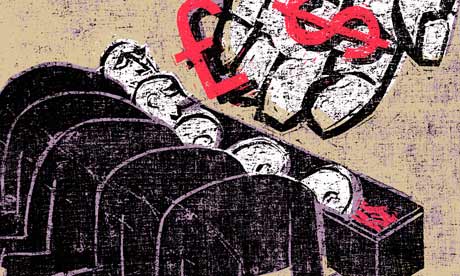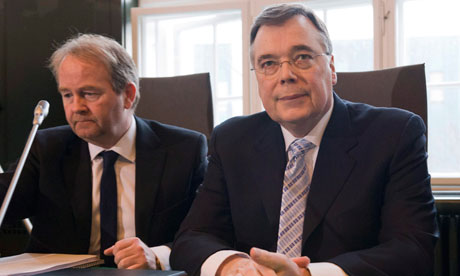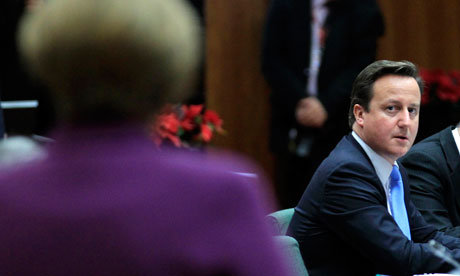Letting taxpayers fund parties directly could revive our rotten system – and at £1 per elector, it would be cheaper too

‘Despite attempts to reform it, US campaign finance is more corrupt and corrupting than it has been for decades.' Illustration: Daniel Pudles
It's a revolting spectacle: the two presidential candidates engaged in a frantic and demeaning scramble for money. By 6 November, Barack Obama and Mitt Romney will each have raised more than $1bn. Other groups have already spent a further billion. Every election costs more than the one before; every election, as a result, drags the United States deeper into cronyism and corruption. Whichever candidate takes the most votes, it's the money that wins.
Is it conceivable, for instance, that Romney, whose top five donors are all Wall Street banks, would put the financial sector back in its cage? Or that Obama, who has received $700,000 from both Microsoft and Google, would challenge their monopolistic powers? Or, in the Senate, that the leading climate change denier James Inhofe, whose biggest donors are fossil fuel companies, could change his views, even when confronted by an overwhelming weight of evidence? The US feeding frenzy shows how the safeguards and structures of a nominal democracy can remain in place while the system they define mutates into plutocracy.
Despite perpetual attempts to reform it, US campaign finance is now more corrupt and corrupting than it has been for decades. It is hard to see how it can be redeemed. If the corporate cronies and billionaires' bootlickers who currently hold office were to vote to change the system, they'd commit political suicide. What else, apart from the money they spend, would recommend them to the American people?
But we should see this system as a ghastly warning of what happens if a nation fails to purge the big money from politics. The British system, by comparison to the US one, looks almost cute. Total campaign spending in the last general election – by the parties, the candidates and independent groups – was £58m: about one sixtieth of the cost of the current presidential race. There's a cap on overall spending and tough restrictions on political advertising.
But it's still rotten. There is no limit on individual donations. In a system with low total budgets, this grants tremendous leverage to the richest donors. The political parties know that if they do anything that offends the interests of corporate power they jeopardise their prospects.
The solutions proposed by parliament would make our system a little less rotten. At the end of last year, the committee on standards in public life proposed that donationsshould be capped at an annual £10,000, the limits on campaign spending should be reduced, and public funding for political parties should be raised. Parties, it says, should receive a state subsidy based on the size of their vote at the last election.
The political process would still be dominated by people with plenty of disposable income. In the course of a five-year election cycle, a husband and wife would be allowed to donate, from the same bank account, £100,000. State funding pegged to votes at the last election favours the incumbent parties. It means that even when public support for a party has collapsed (think of the Liberal Democrats), it still receives a popularity bonus.
Even so, and despite their manifesto pledges, the three major parties have refused to accept the committee's findings. The excuse all of them use is that the state cannot afford more funding for political parties. This is a ridiculous objection. The money required is scarcely a rounding error in national accounts. It probably represents less than we pay every day for the crony capitalism the present system encourages: the unnecessary spending on private finance initiative projects, on roads to nowhere, on theTrident programme and all the rest, whose primary purpose is to keep the 1% sweet. The overall cost of our suborned political process is incalculable: a corrupt and inefficient economy, and a political system engineered to meet not the needs of the electorate, but the demands of big business and billionaires.
I would go much further than the parliamentary committee. This, I think, is what a democratic funding system would look like: each party would be able to charge the same, modest fee for membership (perhaps £50). It would then receive matching funding from the state, as a multiple of its membership receipts. There would be no other sources of income. (This formula would make brokerage by trade unions redundant.)
This system, I believe, would not only clean up politics, it would also force parties to re-engage with the public. It would oblige them to be more entrepreneurial in raising their membership, and therefore their democratic legitimacy. It creates an incentive for voters to join a party and to begin, once more, to participate in politics.
The cost to the public would be perhaps £50m a year, or a little more than £1 per elector: three times the price of a telephone vote on The X Factor. This, on the scale of state expenditure, is microscopic.
Politicians and the tabloid press would complain bitterly about this system, claiming, as they already do, that taxpayers cannot afford to fund politics. But when you look at how the appeasement of the banking sector has ruined the economy, at how corporate muscle prevents action from being taken on climate change, at the economic and political distortions caused by the system of crony capitalism, and at the hideous example on the other side of the Atlantic, you discover that we can't afford not to.



